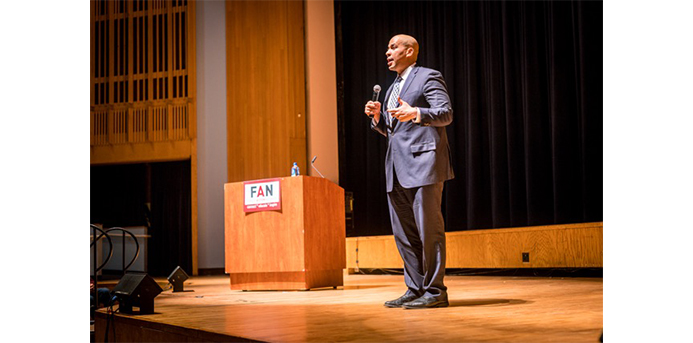Imagine you live in an area hit by a hurricane and roads are impassable. You don’t have power or heat. Your baby is out of diapers. Now imagine your mayor drops baby supplies to your doorstep. He also invites neighbors to his home to charge their phones, watch DVDs and sleep over. This was the reality for residents of Newark, New Jersey, and their then-mayor Cory Booker in the wake of Hurricane Sandy.
Booker has since been elected to the Senate — the fourth of only five African Americans who’ve ever served — and stories of his heroics have traveled with him. The senior U.S. senator from Illinois, Dick Durbin, describes his colleague as “no ordinary politician.” “He’s not just a politician — he’s a hero,” says Durbin, recounting anecdotes about Booker saving a dog from freezing temperatures, personally helping dig out snowed-in residents, and even saving a neighbor from a burning house.
Durbin notes Booker likely had unlimited career opportunities, thanks to an impressive educational resume — he attended Stanford on a football scholarship, became a Football All-American, Rhodes Scholar and was elected senior class president, then graduated from Yale Law School. Yet ultimately he chose public service.
Booker tells his story a little differently. He grew up with a no-nonsense father who kept him grounded despite his achievements with reminders like: “Boy, you got more degrees than the month of July but you ain’t hot,” and “There’s two ways to go through life — as a thermometer or a thermostat.” His parents impressed on their son that simply reflecting the temperature was not enough — that he should help set the climate.
Groundbreakers themselves, Booker’s parents found a way to fight roadblocks and successfully move into a New Jersey suburb in 1969 when only three of 70 communities allowed blacks. Grass-roots group The Fair Housing Council discovered that many realtors were telling black families that a house was sold then turning around and selling it to whites. The group began a practice of sending a white family in to make a bid on a house then having the real bidders — a black family — show up at the closing. That’s how the Bookers were able to buy their home in Harrington Park, becoming, in the words of Booker’s father, “four raisins in a tub of sweet vanilla ice cream.”
Cory Booker’s personal history — like that of many Americans — is deeply rooted in the history of our nation. His passion for America’s foundation and evolution fueled him to write his book “United: Thoughts on Finding Common Ground and Advancing the Common Good.” He admires the American spirit of rugged individualism, but says, “It didn’t get us to the moon or map the human genome or pave our roads.” Booker is adamant that in order to continue to be a strong nation, we must work together. “Our Declaration of Independence contains a declaration of dependence: ‘We pledge to each other our lives, our fortunes, our sacred honor.’ There’s an understanding that we can’t do this alone.”
Likewise, Booker shuns the “Great Man theory” of history, which suggests men like Washington and Lincoln seemingly “came down from on high.” His parents told him, “If you think of history that way, it will disempower you to fulfill your responsibility.” So what does Booker believe to be his responsibility — and ours — to this nation? “Our generation of Americans drank deeply from wells of freedom and liberty and opportunity we did not dig,” he says. “We cannot pay those folks back, we gotta pay it forward.”
Booker shares the story of attorney Arthur Lessman, who handled his parents’ purchase of their Harrington Park home — the one that they could only purchase by pretending to be white. Booker sought him out and asked him why he’d decided to volunteer for The Fair Housing Council in the first place. “I made the decision to help on a Monday,” says Lessman. “I know because the day before was Bloody Sunday,” March 7, 1965, the day of the planned march from Selma to Montgomery over the Edmund Pettus Bridge to bring attention to the shooting of protester Jimmy Lee Jackson. Alabama state troopers and local police blocked the paths of nonviolent protesters, shooting them with teargas and beating them with clubs.
“Did that person on that bridge know that they would unlock events for generations yet unborn? That it would start a chain and change the lives of two young lawyers [Lessman and his partner] to help a family move into a town?” asks Booker. “I wouldn’t be standing here if that didn’t happen.” Again and again, he emphasizes that each of us has the power to make a difference. Quoting novelist Alice Walker, he says: “The most common way people give up our power is by thinking they don’t have any.”
Booker urges us to avoid getting overwhelmed and discouraged and surrendering to cynicism and inaction when we face what’s going on in the world. He says, “Don’t allow your inability to do everything undermine your ability to do something.”
Want more?
- Have 90 minutes? Watch the full video of Senator Booker’s Evanston talk for the Family Action Network. In it, he preaches tolerance and love and tells stories of colorful characters he’s encountered.
- Have a few hours? Read his book, “United: Thoughts on Finding Common Ground and Advancing the Common Good.”
- Want real-time coverage? Follow Booker on Twitter (@CoryBooker).
More from Make It Better:

